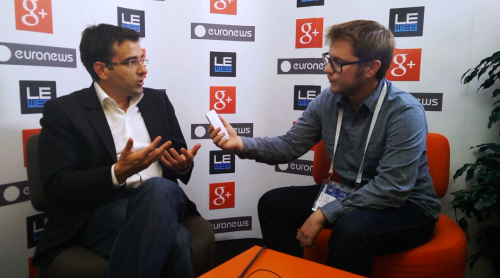Feeling gratified for what you do is so important that, for some, it can overcome a basic monetary remuneration. Some say “what goes around comes around”, some call it “karma”, others simply define it as reputation and track-record. Your past influences how others perceive your current actions. But even for those who think money is the only metric in life, it’s quite intriguing to see what companies such as BlaBlaCar are doing in approaching new markets with no revenue streams at all. “The key challenge is not how and when we monetize”, says BlaBlaCar co-founder Nicholas Busson – pictured in the image with the author of this article during the interview – in his French-American accent during an interview at the latest LeWeb. BlaBlaCar is a ride-sharing service for drivers who want to save money on their trips and passengers who seek a social and affordable way to travel. You need a solid round of funding to focus on growth rather than monetization. Index Ventures, who led this summer’s 100 million dollar investment in BlaBlaCar, is definitely doing it for money. Will they get their money back from a larger round and higher valuation in the future or do they see BlaBlaCar as a cash machine ready to spit out bills? Time will tell, but what’s clear is that having a large user base (over 1M monthly active users last year), makes companies like BlaBlaCar attractive for larger tech companies. While cashing in from only France and Spain at the moment, they are opening new countries, like Turkey, where the company will be 100% focused on the smartphone market. The current statistics range between 30% and 40% mobile usage of the system in countries where the service is already widespread. Payments in many countries are still in cash, from the passengers to the drivers, with BlaBlaCar taking absolutely no share of fees. Watch the whole interview on youtu.be/LGFzIlyxcUk Creating a service that helps people, or better yet, creating a service that enables people to help each other, like BlaBlaCar, Airbnb, and many sharing economy applications is both gratifying from a social point of view and a monetary perspective. What else could you wish for? How does this “robin hoodism concept” — taking away from monopolistic corporate giants and sharing money between middle class people (Uber, Airbnb, Etsy, PeoplePerHour, Freelancer), change the economy? Tory business minister Matthew Hancock said that new services such as Airbnb and PeoplePerHour “are unlocking a new generation of micro-entrepreneurs”. A widespread opinion is that sharing economy apps are driving prices down (i.e. UberPop & low cost Airbnb’s are usually much cheaper than the well established alternatives). Distributing profits over many more people and, in return, more people are benefited. In theory it’s a win-win situation, but as you spread the profits it’s hard to achieve economies of scale for the individual, as he faces more competition from the unified, low prices. Economies of scale for an individual seems an oxymoron, but it’s what has driven capitalism in the past century. Contributor: Carlo de Micheli, @carldemic
© RIPRODUZIONE RISERVATA
